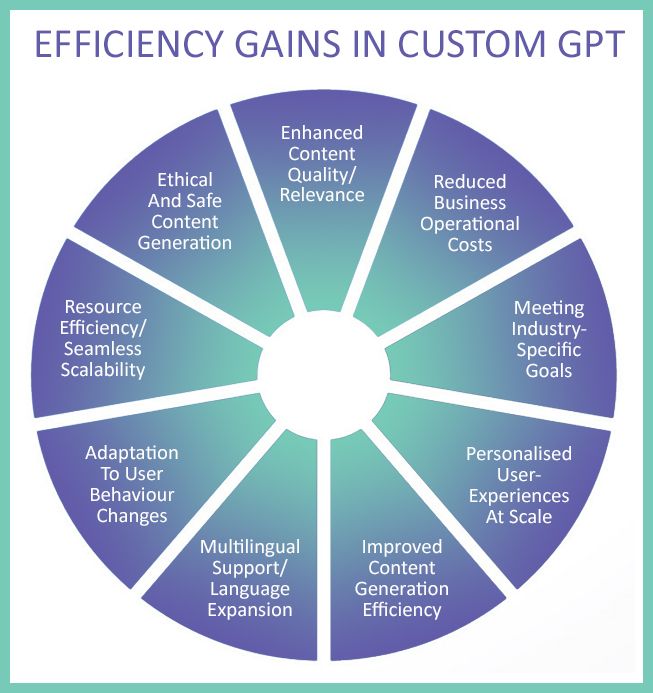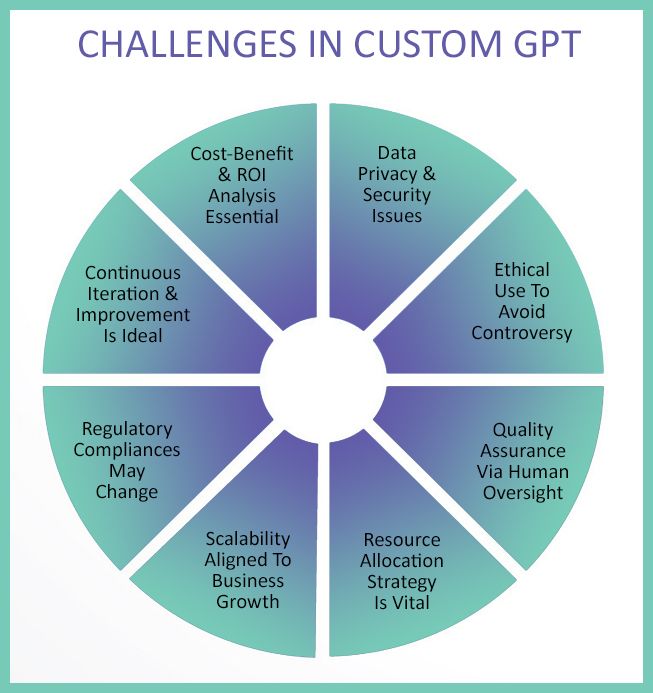A Deep Dive into Efficiency Gains from Custom GPT Implementations

A transformative wave of innovation is now occurring in artificial intelligence and language processing: Custom GPT.
This groundbreaking approach goes beyond mere fine-tuning of larger GPT models. It’s about moulding AI to suit precise business needs. Its power lies in its ability to unlock efficiency, relevance, and personalisation across various applications.
Custom GPT redefines AI by infusing it with domain knowledge, enabling it to excel in content generation, language translation, virtual assistance, and more.
Businesses, driven by the quest for efficiency, are embracing Custom GPT as a game-changer. From streamlining content creation to meeting industry-specific standards, it's reshaping how organisations engage with their audiences.
This blog post will take you into the heart of Custom GPT, unravelling its profound impact. You’ll uncover how it revolutionises industries, adapts to unique challenges and sets the stage for meaningful efficiencies.
Contents
- What is Custom GPT?
- Why does Custom GPT matter?
- Why do businesses use Custom GPT?
- Efficiency gains in Custom GPT
- Enhanced Content Quality and Relevence
- Reduced Operational Costs
- Meeting Industry-Specific-Requirements
- Personalising User Experiences
- Improved Efficiency in Content Generation
- Multilingual Support and Language Expansion
- Adaptation to Changing User Behaviour
- Resource Efficiency and Scalability
- Challenges and Conciderations of Custom GPT
- In summary
What is Custom GPT?
Custom GPT, short for Custom Generative Pre-trained Transformer (inspired by OpenAI's renowned ChatGPT), is a fine-tuned solution based on Large Language Models, applied in a specific business domain.
At its core, Custom GPT retains the fundamental capabilities of GPT models, which involve understanding and generating human-like text based on the input they receive. However, what sets Custom GPT apart is its adaptability to specific tasks, industries, or use cases.
The customisation process involves training the base GPT model on domain-specific data and fine-tuning it to understand industry-specific jargon, context, and nuances. This makes it exceptionally proficient at generating content, answers, or solutions tailored to the precise requirements of businesses and organisations.
Custom GPT's applications are vast, spanning content generation, customer support automation, language translation, and more. It empowers businesses to achieve greater efficiency, enhance user experiences, and navigate complex tasks in an increasingly AI-driven world.
Why does Custom GPT matter?
Custom GPT is a significant advancement in Artificial Intelligence (AI) and Natural Language Processing (NLP) – with profound implications for businesses and organisations. Its importance lies in its adaptability, efficiency gains, and ethical considerations.
Custom GPT can be fine-tuned to understand industry-specific language, context, and requirements, offering tailored solutions for diverse sectors. It automates tasks like content generation, customer support, and data analysis, reducing operational costs and enhancing productivity.
Personalisation is a key strength, as Custom GPT can understand individual preferences, boosting user engagement and satisfaction. Its scalability makes it suitable for businesses of all sizes, while its multilingual capabilities facilitate global expansion.
Moreover, Custom GPT promotes ethical AI practices by avoiding biased or harmful content generation. In a data-driven world, where automation, personalisation, and responsible AI use are essential, Custom GPT empowers organisations to stay competitive and meet evolving user expectations effectively. It thus is a vital tool for the AI-driven future.
Why do businesses use Custom GPT?
Businesses increasingly use Custom GPT to boost efficiency, innovation, and competitiveness. Efficiency lies at the core of this transformative shift. Custom GPT is the linchpin of efficiency gains, automating tasks, streamlining processes, and generating high-quality content with minimal human intervention. From content creation to data analysis and user interactions, businesses aim to achieve more with fewer resources.
Another significant motivation for adopting Custom GPT is the substantial reduction in manual labour. In content generation, Custom GPT models take on the heavy lifting of creating blog posts, product descriptions, and marketing copy, freeing human teams to focus on strategic, creative tasks.
Custom GPT also caters to industry-specific needs, fine-tuning models to meet precise requirements. For instance, in healthcare, it ensures compliance with privacy regulations, while in financial services, it aids in risk analysis and compliance reporting.
Personalisation is paramount in today's consumer-centric world, and Custom GPT empowers businesses to provide tailored experiences. In e-commerce, it recommends products based on individual preferences, while in customer support, it delivers instant, user-specific responses.
Efficiency Gains in Custom GPT
Custom GPT is not merely a technological innovation; it's also a catalyst for transformative efficiency gains. This section below delves into nine ways businesses can leverage Custom GPT to streamline operations, optimise resources, and drive productivity. Each subsection highlights a specific dimension of efficiency gain.

1. Enhanced Content Quality and Relevance
Custom GPT offers a striking efficiency gain for businesses by enhancing content quality and relevance. This transformation transcends mere automation – it's about delivering content that captivates and resonates with the intended target audience.
Custom GPT models are precision-tuned to grasp brand nuances, context, and the desired tone. As a result, they craft content that goes beyond correctness. They provide output that is contextually relevant, engaging, and in harmony with the brand's identity. Whether it involves generating product descriptions, blog posts, marketing copy, or user-generated content, Custom GPT ensures each piece leaves a lasting impression.
For example, a fashion retailer employing Custom GPT could produce product descriptions that describe clothing and evoke emotions and style. This leads to narratives that connect with customers on a deeper level, ultimately driving an increase in online sales as customers relate to the brand's unique storytelling.
Custom GPT redefines content creation, making it efficient and a conduit for brand excellence. Apart from the benefits of saving time, it can help by leaving a lasting impact on your audience through content that resonates and engages.
2. Reduced Operational Costs
A standout efficiency gain achieved through Custom GPT implementations is the significant reduction in operational costs. This efficiency transformation is rooted in automating tasks that were once labour-intensive and resource-heavy.
Custom GPT models are precision-engineered to execute various functions across diverse industries. By harnessing their capabilities, organisations can substantially curtail operational expenses associated with manual labour, human errors, and resource allocation. Whether it pertains to automating content generation, data analysis, or customer interactions, Custom GPT streamlines processes, boosts productivity, and ultimately leads to substantial cost savings.
In content creation, for example, Custom GPT can generate high-quality content such as blog posts and product descriptions swiftly and cost-effectively. In customer support, AI-driven chatbots powered by Custom GPT efficiently manage a substantial volume of inquiries, reducing the need for a large customer service team.
These operational efficiencies bolster profit margins, positioning businesses for greater competitiveness and resilience in a dynamic marketplace. Custom GPT is undeniably a transformative force, enabling organisations to optimise resources and achieve operational excellence.
3. Meeting Industry-Specific Goals
Efficiency gains from Custom GPT implementations extend far beyond general operational enhancements. They become particularly impactful when aligned with industry-specific goals and requirements.
In sectors like healthcare, Custom GPT can expedite patient data analysis, accelerating diagnoses and treatment planning while ensuring compliance with stringent regulations. Financial institutions benefit from enhanced risk analysis, fraud detection, and tailored customer experiences, improving operational efficiency and customer satisfaction.
In e-commerce, Custom GPT streamlines inventory management, optimises pricing strategies, and personalises product recommendations, increasing sales and overall efficiency. Media and entertainment companies leverage Custom GPT to automate content creation and recommendation systems, bolstering user engagement and revenue.
For manufacturing, Custom GPT aids in predictive maintenance and quality control, minimising downtime and maximising production efficiency. Across diverse industries, aligning Custom GPT with specific objectives optimises its efficiency gains, demonstrating its potential as a transformative force in achieving industry-specific goals.
4. Personalising User Experiences
A remarkable efficiency gain brought about by Custom GPT is the ability to personalise user experiences at scale. Personalisation is a driver of user engagement, satisfaction, and business success.
Custom GPT models are fine-tuned to understand user preferences, behaviours, and needs. They excel in tailoring content, recommendations, and interactions, creating a highly personalised user journey. Whether it's e-commerce product suggestions, personalised marketing emails, or adaptive virtual assistants, Custom GPT enhances engagement, retention, and operational efficiency.
For example, an e-commerce platform employing Custom GPT can provide users with product recommendations precisely aligned with their preferences. This personalised approach fosters user satisfaction and boosts conversion rates, resulting in a more efficient sales funnel.
Custom GPT doesn't just streamline processes – it elevates the quality of user interactions. By tailoring content and recommendations to individual preferences, businesses can foster deeper connections with their audience, enhance engagement, and drive conversions of engaged users into loyal customers.
5. Improved Efficiency in Content Generation
Custom GPT has ushered in a new era of efficiency by revolutionising content generation. This efficiency gain helps redefine productivity and enables businesses to produce high-quality content at scale.
Custom GPT models are precision-tuned to understand brand voice, context, and audience. They excel at generating a wide range of content, from blog posts and product descriptions to marketing copy and user-generated content. Custom GPT can not only automate content creation but also accelerate production without losing quality and consistency.
For instance, a news agency implementing Custom GPT can increase its article output while upholding accuracy and growing readership and advertising revenue. Similarly, a content marketing agency offering automated blog post creation can see benefits through client growth and revenue.
Custom GPT doesn't just expedite content generation – it also elevates the quality of content, ensuring it aligns with brand identity and audience expectations. This efficiency gain allows businesses to focus on strategy and creativity while maintaining a consistent and engaging online presence.
6. Multilingual Support and Language Expansion
One of the profound efficiency gains unlocked by Custom GPT is its ability to expand language capabilities and provide robust multilingual support. In a world where global reach is a critical competitive advantage, Custom GPT offers a transformative solution.
Custom GPT models can be meticulously fine-tuned to support multiple languages, enabling businesses to translate content efficiently, provide multilingual customer support, and expand into international markets. This expansion fosters global efficiency and outreach.
For instance, an e-commerce platform can significantly expand its customer base after implementing Custom GPT for multilingual support, breaking down language barriers and enhancing the user experience for international customers. Similarly, a tech startup can increase its global revenue by using Custom GPT for multilingual customer support and documentation.
Custom GPT doesn't just streamline language expansion – it enhances the efficiency of cross-cultural communication, enabling businesses to easily tap into new markets and cater to diverse customer bases. It's a robust global expansion and operational excellence tool in an interconnected world.
7. Adaptation to Changing User Behavior
Custom GPT drives efficiency gains through its remarkable ability to adapt to evolving user behaviour and preferences in real-time. In a dynamic digital world, this adaptability is a game-changer for businesses seeking to stay relevant and engage their audience effectively.
Custom GPT models continuously analyse user interactions, learning and adjusting recommendations based on changing preferences. Whether content recommendations on a streaming platform or personalised workout plans on a fitness app, Custom GPT can optimise user engagement, retention, and operational efficiency.
For example, a social media platform can witness increased user activity after deploying Custom GPT for personalised content recommendations. Similarly, a fitness app adapting workout recommendations based on user progress could hope to see a resulting increase in user retention and overall efficiency.
Custom GPT doesn't just streamline user interactions – it ensures that businesses remain agile in responding to shifting user preferences. This adaptability fosters stronger user engagement, enhances customer satisfaction, and ultimately drives operational efficiency by aligning content and services with user expectations.
8. Resource Efficiency and Scalability
Custom GPT serves as a catalyst for efficiency gains by optimising resource management and enabling seamless scalability. This capability is particularly crucial in today's fast-paced and ever-evolving business milieu.
Custom GPT models are designed for resource efficiency, performing tasks precisely while minimising resource consumption. They can operate seamlessly across various platforms, whether on-premises servers, cloud infrastructure, or edge devices. This versatility enhances operational efficiency by maximising resource utilisation.
For instance, a cloud service provider can reduce infrastructure costs while improving performance by implementing Custom GPT for resource allocation. Similarly, a startup can efficiently scale its mobile app using Custom GPT for server resource management, saving on hosting costs.
Custom GPT doesn't just optimise resource allocation – it empowers businesses to scale their operations efficiently. Whether handling increased demand during peak periods or expanding into new markets, Custom GPT ensures that resource allocation is streamlined, cost-effective, and aligned with business goals. It's a powerful tool for fostering growth and maintaining operational efficiency.
Challenges and Conciderations of Custom GPT
While Custom GPT offers a plethora of efficiency gains, its implementation is not without challenges and considerations that businesses must carefully navigate. Here are just a few of the critical issues to watch out for.

1. Data privacy and security: Fine-tuning GPT models requires substantial data, potentially including sensitive information. Protecting data privacy and ensuring robust security measures is therefore paramount.
2. Ethical use: AI-generated content can inadvertently produce biased or harmful content. Ensuring the ethical use of Custom GPT is essential to avoid controversies.
3. Quality assurance: While GPT can automate content generation, human oversight remains critical for quality assurance to avoid errors and maintain content consistency.
4. Resource allocation: Training Custom GPT models demands significant computational resources and expertise. Determining a clear resource allocation strategy is vital.
5. Scalability: As businesses grow, the scalability of Custom GPT implementations must be considered to accommodate increasing workloads and user demands. This also helps save costs that accompany growth.
6. Regulatory compliance: Industries like healthcare and finance have stringent regulatory requirements, and many rules may change over time. It is essential to ensure that Custom GPT can align with industry-specific regulations as they evolve.
7. User feedback: Monitoring user feedback is crucial for fine-tuning GPT models over time and improving user experiences. Iteration-driven optimisation has to be a continuous process.
8. Cost-Benefit Analysis: Assessing the cost versus benefits of Custom GPT implementation is vital to ensure the investment aligns with business objectives. ROI calculations are essential at the implementation stage and subsequent evolutions.
In Summary
In the age of AI, Custom GPT is a powerful tool for businesses, driving efficiency, personalisation, and adaptability. However, it is vital to remember that while Custom GPT offers immense utility, its use should always be purposeful and guided by clear objectives.
Businesses must harness this technology carefully, adhering to ethical practices, data privacy, and regulatory compliance.
When used judiciously and in alignment with specific goals, Custom GPT stands as a testament to the potential of AI to transform industries and enhance user experiences. Custom GPT can pave the way for a future where intelligent automation and human ingenuity harmoniously coexist.
